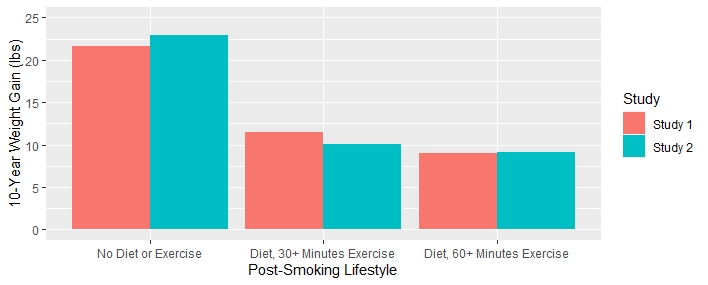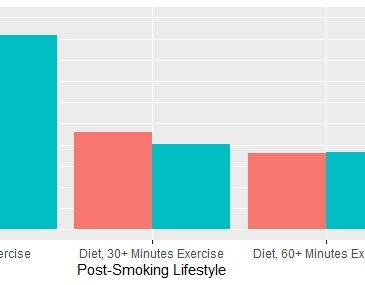A fear of weight gain is a deterrent for many people who would otherwise quit smoking, particularly women. But what if breaking a smoking habit was replaced with new, healthy habits, such as exercising for 30 minutes each day and eating fewer sugary foods? ASHES reviews a paper by Priyanka Jain and colleagues, which examined whether women who stick to a healthy diet and exercise regularly avoid most of the weight gain that typically follows from smoking cessation.
What was the research question?
How much weight will women gain on average 10 years after quitting smoking and how much less weight will they gain if they exercise and have a healthy diet?
What did the researchers do?
The authors used data from the first ten years of two longitudinal studies of female U.S. nurses who reported smoking when the studies began (Study 1 = 10,087 participants; Study 2 = 9,271 participants). Every two to six years, participants reported on their health behaviors, including how many cigarettes they smoked each day, how many hours per week they spent exercising, their body weight, and their consumption of various different types of foods (e.g., red meats, white meats, nuts). The authors used the parametric G-formula to compare weight change in participants who had stopped smoking to weight change in participants who smoked 5 cigarettes a day, 10 cigarettes a day, 15 cigarettes a day, and 20 cigarettes a day. Finally, among participants who had stopped smoking, they compared weight gain among those who engaged in varying amounts of exercise per week, as well as those who did and did not have a healthy dietary strategy.1
What did they find?
In study 1, individuals who had stopped smoking for ten years on average weighed 17.4 pounds more than individuals who had consistently smoked 20 cigarettes a day for ten years. In the second study, the same comparison yielded a 13.9 pound difference. However, in both studies weight gain was about 11 lbs lower (a statistically significant difference) for those who not only quit smoking, but also exercised for at least 30 minutes a day and had a healthy diet (i.e., two or fewer servings per week of unprocessed red meat, at least five servings per day of fruits and vegetables, and no sugar-sweetened beverages, no sweets, desserts, potatoes, or processed red meat; see figure). Exercising at least 60 minutes a day did not significantly increase weight loss compared to exercising at least 30 minutes a day, suggesting potential diminishing returns for additional exercise for those who already keep to a strict diet.

Figure. The x-axis represents different health behaviors participants might adopt after quitting smoking.2 The y-axis represents the average number of pounds that participants in each study gained ten years following quitting smoking. The results from Study 1 are in red; the results from study 2 are in blue. Click image to enlarge.
What do these findings matter?
Randomized controlled trials had found that pairing smoking cessation with calorie restrictions and exercise sessions do little to reduce weight gain in the short term. However, this study suggests that simply having a healthy diet— defined not by calorie restriction, but rather by consuming few unhealthy foods and many healthy foods— and exercising regularly might substantially reduce weight gain in the long term for those who quit smoking.
Every study has limitations. What are the limitations of the study?
The two study samples had a low proportion of non-white members, so the results may not generalize to all women in the U.S. Also, it is possible that the authors were not able to account for all factors that independently cause a healthier lifestyle and less weight gain, such as psychopathology.
For more information:
SmokeFree offers tools and tips for quitting and maintaining abstinence from smoking tobacco. The Centers for Disease Control and Prevention offers information, tips, and tools about e-cigarettes and how to quit. For self-help tools, please visit The BASIS Addiction Resources page.
— William McAuliffe, PhD
What do you think? Please use the comment link below to provide feedback on this article.
________________
[1] To account for non-causal reasons why diet and exercise are associated with less weight gain after giving up smoking, the authors controlled for factors that are thought to affect diet, exercise, and weight, such as high stress, marital status, menopausal status, and employment, into their statistical models.
[2] “No diet or exercise” refers to not engaging in any “moderate-to-vigorous exercise” (viz., brisk walking, jogging, running, bicycling, swimming, calisthenics, aerobics, tennis, or racquetball) or adopting a “healthy diet” (i.e., two or fewer servings per week of unprocessed red meat, at least five servings per day of fruits and vegetables, and no sugar-sweetened beverages, no sweets, desserts, potatoes, or processed red meat) in the 10 years following smoking cessation. “Diet, 30+ Minutes Exercise” refers to at least 30 minutes but less than one hour of daily moderate-to-vigorous exercise and adopting a “healthy diet” for the 10 years following smoking cessation. “Diet, 60+ Minutes Exercise” refers to at least 60 minutes of daily moderate-to-vigorous exercise and adopting a “healthy diet” for the 10 years following smoking cessation.




